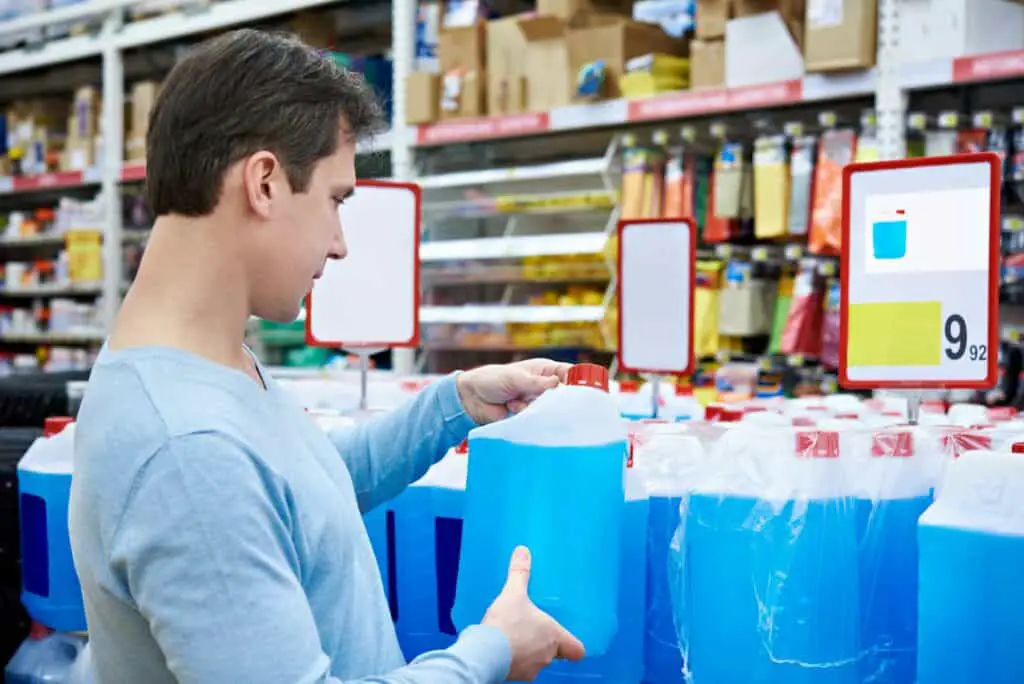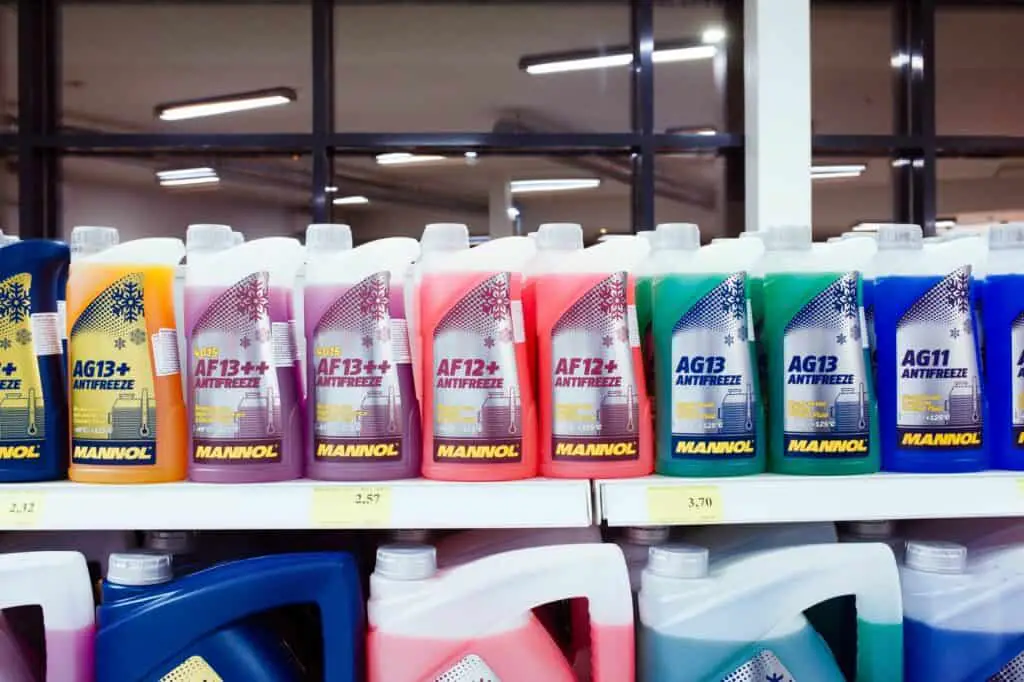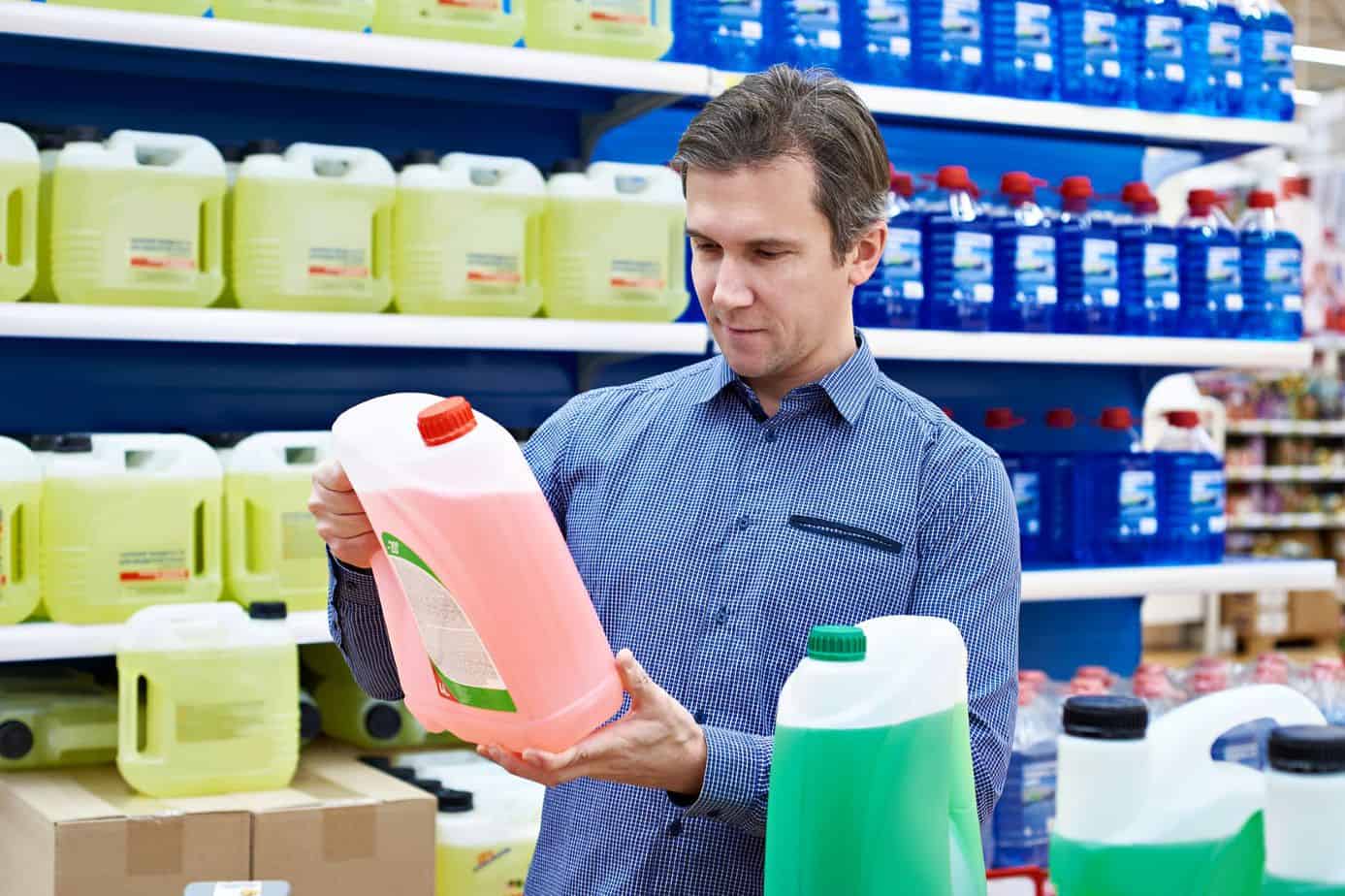If you own a travel trailer or RV and live in a climate prone to freezing temperatures, you will need to use some type of antifreeze to ensure that the unit’s lines do not freeze. You may have wondered if the RV antifreeze that you used is toxic. After all, even if you flush the lines, there is at least a minuscule amount of antifreeze left in pipes. Is RV antifreeze non-toxic and safe for your family after flushing the system?
RV Antifreeze is non-toxic, but you don’t want to consume it in quantity. If you use RV antifreeze explicitly made for travel trailers and motorhomes, they are non-toxic and biodegradable. In other words, if there is a slight amount of residue of the antifreeze left over after you have flushed your system, the odds are that your water in the unit will be safe for human consumption.
Now that you can feel comfortable using the plumbing in your RV or travel trailer after it is flushed, there are several different RV antifreeze types that you can use to winterize. While the antifreeze brand is not that important, make sure that you only use a product that is made specifically for use in an RV.
RV Antifreeze
Not all antifreeze is alike, and not all chemicals should be used in your motorhome or travel trailer. Antifreeze specifically designed for use in a vehicle will not work the same in your camper and will be toxic, even in small doses. Ensure that you use only those chemicals specifically designed for an RV that is non-toxic and biodegradable.
Know that the chemicals in the RV antifreeze breakdown over time, and each one has a different shelf-life. Know what the self-life is for the antifreeze you purchase. Once the self-life has expired, the antifreeze will not work the same as it is designed to do, which could leave your pipes open to damage over the winter.
Using it increases the risk that your system may not be as protected as you need during the winter months. The last thing that you want is your pipes exploding in your RV. If you are taking the time to winterize it, take the time to make sure the chemical will work.
RV Antifreeze vs Engine Antifreeze
There are many different reasons why RV and engine antifreeze are different. Without getting into chemical specifications for each product, it can simply be explained that one is to cool the engine in a vehicle, and one is to keep water from freezing.
Engine antifreeze is also toxic to humans and animals, even in small amounts. That means that it cannot be used in anything that will eventually lead to ingesting into your body. Antifreeze explicitly made for an RV is developed to leave it non-toxic in exceedingly small doses.
Different Brands
There are several different places that you can purchase RV antifreeze for your camper. Which brand you buy is not as important as the shelf-life for the chemical. When it comes to selecting which RV antifreeze is right for you, Amazon has several good, viable options that are not expensive.
Check their current price on Amazon by clicking below.

Get a FREE copy of the Go Together Go Far Travel Trailer Hookup and Disconnect Checklist when you sign up for the Go Together Go Far Newsletter!
Common RV Antifreeze Questions
Over the years, new campers have asked many questions regarding the use and safety of RV antifreeze. While some may be embarrassed to ask the questions, others have not. Thankfully, the main questions and answers are listed below:
| Question | Answer |
|---|---|
| Is it safe to consume | Yes, in tiny doses, as in plumbing residue |
| Can it be reused | Yes, but you should not |
| Is it toxic to animals | Yes, depending on how much they ingest |
| Is it safe for the environment | Yes, if properly diluted and discarded |
| Will it kill grass | If not adequately diluted, yes |
| Is it safe for the septic system | Yes |
Is RV Antifreeze Safe To Consume?
RV Antifreeze is safe to consume if it is in small doses. Remember, antifreeze is made of chemicals that are designed to prevent water from freezing. Ingestion of any chemical in large amounts is going to be toxic to a human or animal.
When it is time to remove the antifreeze from your system, make sure that you flush the pipes thoroughly to remove as many chemicals as possible. If you are unsure of how to flush your system correctly, look up the instructions for your specific travel trailer or motorhome on the internet.
If, after flushing your system, there is still a minute amount of residue left behind, there is no need to worry. Consumption of small amounts of the non-toxic antifreeze will not harm any person or animal.
Can You Reusing RV Antifreeze?
Some people have asked if it is possible to reuse the RV antifreeze or camper during the next winter season. While, in theory, the answer is yes, it is not recommended.
Remember that you are flushing your system after the winter months, which means that any antifreeze removed from your camper will be diluted. Know that if you plan to reuse the antifreeze, it will not have the same strength next season as it did the first time it was used.
The chemicals in antifreeze breakdown over time. Where some can last five years, others are only good for a year. If you are planning on reusing your antifreeze, make sure to consider that the chemicals may have passed their self-live and have been diluted before reusing the antifreeze.
Again, the cost of the chemical each year is far cheaper than the cost of repairing the damage caused by a pipe bursting in the RV.
Is RV Antifreeze Toxic To Animals?
Just like the answer for the humans above, if there is a minute amount leftover in your pipes after flushing, the odds are that the water will be safe for human and animal consumption alike. However, any amount in large doses to either a human or animal will be toxic. This is especially true in cases of a smaller framed animal.
Much like engine antifreeze, animals will be attracted to the smell and taste of antifreeze for an RV. If an animal consumes the antifreeze without it being sufficiently diluted, it will be toxic and could kill the animal.

Is RV Antifreeze Safe For The Environment?
Most of all, RV antifreeze companies tout that their product is made from biodegradable materials and is safe for the environment. While this may be true, that does not mean that the chemical should be dumped onto the ground after it is used for winterizing.
When flushing your system, make sure you do so correctly and not just dump the chemical straight onto the ground. The antifreeze should be recycled appropriately or flushed to avoid any damage to the environment.
Will RV Antifreeze Kill Grass?
The easy answer to this is yes, in large doses. If you plan on flushing your system straight onto the ground at your home or other location, the large amount of chemical that will be dispelled from the RV will kill the grass.
However, if a small amount spills onto the ground, the odds are that the grass will be fine. The key is ensuring that only small doses are exposed to the environment instead of large amounts.
Is RV Antifreeze Safe For Septic Systems?
The chemicals used in the making of antifreeze for an RV are biodegradable. That means that it is safe to use in most septic systems. If you plan on flushing your system and dumping the blackwater down a sewer hookup, the odds are that it will be safe to do so.
If you were not sure, it is not okay to dump your blackwater on the ground.
Considerations
If you are going to do something, a wise person once said, do it right and do it right the first time. The same can be said when it comes to winterizing your RV.
You invested when you purchased your RV or travel trailer, and the unit needs to be taken care of to ensure that it will last a long time and not leave you stranded. Taking the time to ensure that you have winterized your unit properly with the right RV antifreeze is extremely important.
If you do not winterize your RV or camper properly and you live in an area prone to freezing, your pipes will have damage. Finding the damaged area can be difficult and hard to get to the inside of the unit. Not to mention, if the pipes burst, the odds are that there will be other damage done inside of the unit that will need repair.
If you take time to winterize your camper or RV properly, take the time to flush all the lines properly before consuming the water in your unit. Even though the RV antifreeze is non-toxic, as explained above, the system should be flushed thoroughly before drinking any water.
Conclusion
RV antifreeze is non-toxic and safe for human and animal consumption in small doses. That means that you still must flush the water pipes entirely before consuming any water from the RV or camper that you have winterized.
Knowing what you can and cannot do when you go camping is important to ensure a pleasant experience for you and your family. Please pass on this information to anyone you know is new to camping on your social media feeds.
Get a FREE copy of the Go Together Go Far Travel Trailer Hookup and Disconnect Checklist when you sign up for the Go Together Go Far Newsletter!


